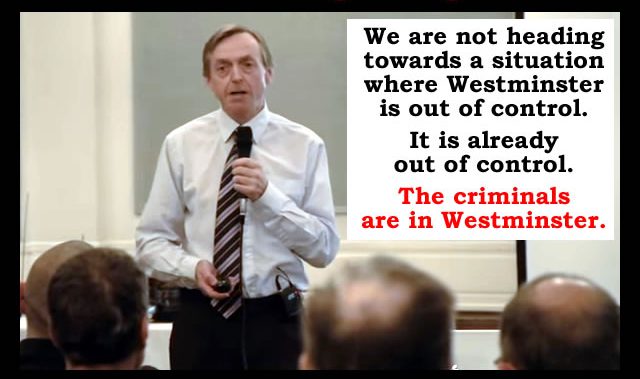Brian Gerrish’s testimony to Reiner Füllmich: Our oppressors are very frightened people (I)
On 28 May 2021, Brian Gerrish gave evidence to the 54th session of the Stiftung Corona Ausschuss, the German-based extraparliamentary inquiry by lawyers into the medical establishment’s and public policymakers’ handling of the Covid crisis internationally. The theme for the day during the 54th session was “Caught between nudging and side effects”. A transcript of this testimony is below.

Reiner Füllmich: Brian, I apologise for having kept you waiting for twenty minutes or so.
Brian Gerrish: That’s absolutely fine, and I’d just like to say that I don’t speak German but it was fascinating watching you and listening, and it was wonderful to see you start laughing, because you looked very serious in most of the dialogues that I’ve listened to.
There was one word that I picked up that I found very interesting, and that was ‘Wahnsinn’, which came up several times, particularly when [persecuted primary school headmistress] Bianca was speaking.
Reiner Füllmich: You know what it means, right?
Brian Gerrish: Yes, “madness”. And I’m going to say to you: it’s not madness. What we are facing is calculated, and it’s a mistake to call it “madness”, because it’s very precise; it’s very calculated. We need to understand that in order to be able to deal with what we’re facing.
Reiner Füllmich: That’s very interesting to hear, because we have come to the conclusion that “the other side”, as we call them, is using two major tools. One is, of course, psychology, psychological operations; and the other, which transports this psychological operation, is the mainstream media.
Can you tell us a little about your background?
Brian Gerrish: Well, my personal background is, professionally, I was military: I was in the Royal Navy for twenty-one years. I then worked in industry, essentially, for a while, but after a few years, I began to understand that certain aspects were not good in the UK, and I began to see them more clearly and investigate.
Ultimately, that’s led me, over nearly another twenty years, to team up with a gentleman called Mike Robinson, and for fourteen years now, we’ve been running a media outlet called the UK Column, where I’m delighted to say that we’re expanding, and it’s clear that our viewers and listeners are now not only in the UK; they’re across the world.
Reiner Füllmich: Excellent. And now, of course, you’re busy covering coronavirus and all the ramifications of what coronavirus is bringing about.
Brian Gerrish: Well, the key point is that we originally started by looking at some of the issues that you’ve just mentioned. We were looking at how propaganda had come into the country; we were looking at the use of applied behavioural psychology by the Government; and we were looking at changes which were very serious (or we thought they were very serious) that were particularly affecting the style of democracy, and that were also affecting our constitutional rights.
It was against that background of reporting that we have then encountered, obviously, what’s occurred with Coronavirus. So I would say to you that our analysis of what has occurred with Coronavirus is seen very much against the background of what was occurring politically, and in particular the use of applied behavioural psychology and propaganda.
Viviane Fischer: So what do you think is the “calculated madness”? The [description] “madness” is more our judgement from when we look at what was the normal status of things before. No-one would have thought, had you asked us a year ago, that this could have ever occurred; at least not us, I guess.
And also, we were really surprised how the legal system has deteriorated, or at least, how it has become obvious that it is really in bad shape. But we also have the feeling, at the same time, that it’s very orchestrated, what’s occurring: that it’s like a jigsaw puzzle. They move this piece and this piece, and then the picture is becoming more and more clear what’s going on. But what are your experiences or your analysis of the situation?
Brian Gerrish: First of all, I’d agree with you that the Coronavirus “pandemic”, if we want to call it that in inverted commas, did catch everybody by surprise. I don’t think we saw that coming, and it occurred very quickly. So I’d certainly agree with you on that.

But I’ll come back to the fact that we started to see very, very serious facts occurring in the UK. If I just focus immediately on the Government’s use of applied behavioural psychology: back in 2010 and 2011, we as the UK Column were warning that the Government had set up a team which was called the Behavioural Insights Team [UK Column note: whose former homepage address ‘behaviouralinsights.co.uk’ now redirects to the consciously globalist ‘bi.team’]. This was a team of psychologists who were working directly alongside not only the political process, but the policy-forming process within the British Government.
A critical document which we found in 2010 was called Mindspace (you can find it very easily by searching online for it as a PDF document).
In that document, the Government admitted that it was using applied behavioural psychology to influence how it designed policy and how it implemented policy.
At one particular point in that document – in fact, it’s at the bottom of page 66, if I remember correctly – the Government boasts that it can change the way people think and behave, and that people will not be aware that this has been done to them. But it adds the caveat that if they do realise that their behaviour is changed, they will not know how it was changed.
We read this document and we were shocked, and we then started to research further. That then led us to discover that, around that time and of course a little bit earlier, the British Government had been conducting meetings with the French, in which we were bringing the political psychology teams together to produce joint plans with the French. The key Frenchman who was present in the meetings was called Olivier Ouillier, and he was working directly at that time for Sarkozy’s private office.
Now, all these meetings were essentially held in secret. We were able to discover that they had taken place, but we were only able to discover that by carefully researching along specific routes which we understood were important. For example, most of these meetings were conducted under the guise that they were part of a charity, the Franco-British Council, which said it was simply set up in order to improve relationships between Britain and France.
So these meetings took place, and it was very clear that there was concerted effort to expand the use of these techniques: not only from Britain and France, but the implication at that time was that these techniques were going to be used across the wider power base of the European Union.
And I’ll just say again that the Mindspace document was boasting that this was the first time the Government would be able to use applied techniques where people would have their behaviour changed – that means their thoughts changed! – and they wouldn’t even be aware that it had occurred.
Reiner Füllmich: For what purpose?
Brian Gerrish: Well, if you want to execute power, then you’re going to pursue and use normal, democratic politics, or you’re going to aim and use force, or you’re going to pursue and use other means.
And so this comes to me as other means. I have to say that when I saw how cynical this was, how calculated it was, when I was using effectively my military background, I could see that this was the use of raw power.
Now, if I jump forward into events around covid: very early on in the covid pandemic (I’ve called it a “pandemic”; of course, I don’t believe that that is what it is, but that’s how it was reported), it came to our attention that the Government scientific advisory group, SAGE, had actually had an internal meeting with elements of the Government’s Behavioural Insights Team.

The key gentleman concerned with this was a man called Dr David Halpern. That meeting was not properly minuted in a proper official sense, but they did put out a briefing sheet from the meeting, and in that document, which I think was dated 22 March 2020, it admitted that the SAGE team and the Government’s policy on coronavirus was going to use applied psychology in order to ramp up fear in the population, in order to get the population to adhere more closely to the Government’s policy over the response to coronavirus.
We have the document; we can provide you with a copy of that document.
Reiner Füllmich: Yes, please, because we have the same fact. It’s a leaked paper from the [Federal] Secretary of the Interior, and it is now referred to as the Panic Paper [UK Column note: reported by us on 10 February, commencing at 53:15].
Brian Gerrish: Yes, I’ve heard about the paper in Germany. I haven’t seen it or been able to read it in English. I’m going to suggest to you that that German paper would have come out of the specific talks that I just referred to. When we started to see that the British Government was having these secretive meetings with French applied behavioural psychology experts, it was clear to us that this was going to be rolled out in other European countries. So I was not surprised when I heard about that German document.
Now, in the SAGE document, aside from saying that they were going to ramp up fear, there was something very interesting. It said [UK Column note: in paras. 6–8 on p. 2] that inside [local] communities, community members were going to be used to effectively police each other. So people were going to be used to put pressure on their neighbours, for example, to wear a mask, to adhere to social distancing.
So it was very clear in what they were talking about that they were going to use this covert applied psychology to pressurise citizens to act against one another. And, significantly, they also said that this had to be done with some care, because they believed that it was possible that this situation could get out of control. Clearly, what they meant by that is that instead of having somebody saying to somebody else, “You should wear a mask!”, that requirement could be translated into violence.
Having told you about that document – very clear-cut, very specific – I now come back again to Bianca talking [just before Brian Gerrish], because I could understand a little bit of what she was talking about: she talked about angst, she was talking about stress.
Now, of course, the techniques that are being used on adults – these psychological techniques to induce stress and fear – are also being used on the children. I could only understand a tiny bit of what she was talking about, but I understood enough to grasp –correct me if I’m wrong – that the rules change, so she doesn’t know what the rules are from time to time.
Reiner Füllmich: Exactly, yes. Every week, they modified the rules [for schools], so that she had to sit at her desk over the weekend in order to figure out how to make these things work.
Brian Gerrish: Right. And what that is, the uncertainty and the change in the rules: that is part of the psychological attack. Because the uncertainty immediately is putting people in a position of stress and anxiety and confusion. And if we go back into the professional world of applied psychology, people who are in a distressed, confused state are very susceptible to further messages and instructions. If there’s a fire in a building and people are starting to panic, the first person that starts to give clear commands to the people, those commands will be followed. And that is due to the psychological state.

Now, I’m not professionally trained in psychology; I do know a reasonable amount, which I’ve now learnt as a result of the investigations that I do.
But the other point that I want to bring into this is that many years ago, we started to get very interested in a charity called Common Purpose. Common Purpose, as a charity, said it was there to create “future leaders in society”.
It effectively was like an octopus: it had tentacles, it got into the hospital system, it got into the police, it got into the military, it got into the schools. And once inside these organisations, it was essentially spreading a new philosophy in many areas.
Everything I’m saying to you is fully documented. I have a website (www.cpexposed.com) which is packed full of documents talking about what this organisation was doing. It particularly went for children. In the earliest days, it was going for children of the age of about 11 to 14, but it also was interested in university students.
Aside from the fact that the people who went on [its] courses were selected, they were also keen to get younger people into their so-called training courses.
When I was investigating this organisation, because I was extremely suspicious about what it was doing (it was a very interesting claim to be “choosing future leaders” who were going to “lead beyond authority”!), [I found that] the training was clearly designed to produce people working in an organisation who were not working in the normal culture of the organisation. Common Purpose had given them a new set of values.
When I took some expert advice on how they were doing this, that was the first time that I was told about the technique of neurolinguistic programming. NLP is actually a form of hypnosis. You can look on the internet and you will find many consultancies providing training in NLP, and you will find many people providing training who say that it has a therapeutic [value], that it can be used to care for people and help people.
In essence, this is true; but what we were interested in is where we started to see the use of neurolinguistics in government policy.
So, [we need to] bring these two together:
– It is a fact that the British Government set up a specific applied psychology team.
– It is a fact that that team was promoting ideas to make the population fearful around the pandemic.
But, on a much bigger scale, that team was using – amongst other tools – NLP in order to influence virtually every document that the Government was producing.
I don’t know whether any of your team have come across NLP before, but I’ll say that it’s an open secret (you can go and research it, and many professional people teach it) that essentially it’s a form of hypnosis. And this means that you can put across ideas and concepts to people which are not necessarily just going through their conscious vision.
This is fact; this is not fiction.
Now, when you start to see NLP being used for political objectives, of course, the wider public is very, very vulnerable, because unless you have a little bit of training or knowledge of NLP, you won’t even realise that it’s being used on you, and it can be used in a verbal sense but it can also be used in writing.
So, for example, you can have a document in front of you: you may notice a full stop at the end of a sentence; that marker is in the wrong place, and you believe that somebody made a mistake when they were typing.
But this is not what NLP can do, because when you are reading the sentence and you come to the full stop, your conscious mind makes one decision but your subconscious mind makes another one. And it is perfectly possible to be writing documents where it appears that one message is being put across but actually a completely different message is being put to the audience.
If I bring this into the realm of coronavirus reaction, we are now seeing that every statement made by the Government, every piece of paper that comes out, is invariably very carefully crafted, it’s very carefully put together, and I can see that in much of this documentation, carefully-applied behavioural psychology is being used in the written word.
To back that up, to reinforce that: we also have a government document where they are specifically boasting of being able to use psychology in written documents.
Read the second part of the article
yogaesoteric
December 12, 2021
Also available in:
 Français
Français
